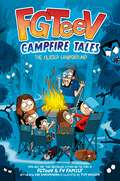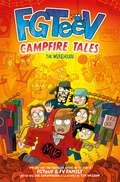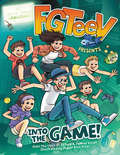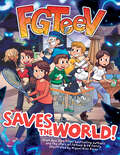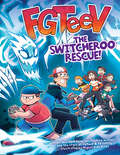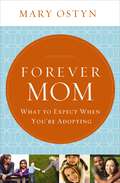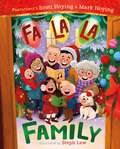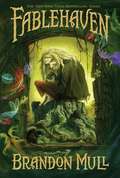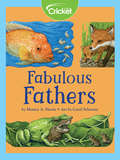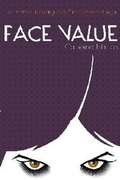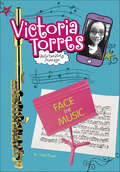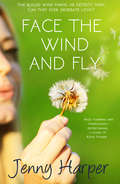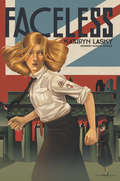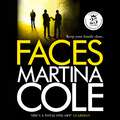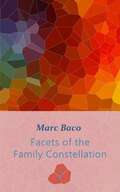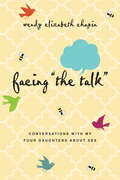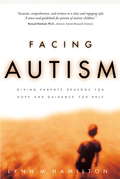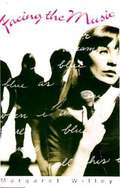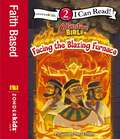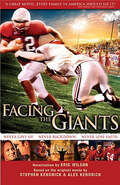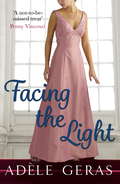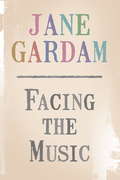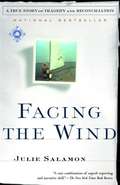- Table View
- List View
FGTeeV Campfire Tales #1: The Cursed Campground (FGTeeV Campfire Tales #1)
by FGTeeVThings are about to get spooky...monstrously spooky! Prepare to be haunted by this hilarious, all-new series from YouTube’s favorite gamer family, FGTeeV! It is a dark and stormy night, and the FGTeeV family is headed out to the woods for some old-fashioned, unplugged together time. But all is not as it seems at the cabin Duddy rented…strange mysteries are afoot. BIG-afoot.Yep, the craziness all starts when Duddz accidentally summons Bigfoot to the campground. Before they know what’s going on, vampires, mummies, sea monsters, and more are all hot on their tails! Will Moomy, Duddy, Lexi, Mike, Chase, and Shawn be able to figure out what’s going on…before they become a monster’s next meal?Read along to find out in the first book of this all-new, highly illustrated middle grade series from beloved gamers and New York Times bestsellers FGTeeV!
FGTeeV Campfire Tales #2: The Werehouse (FGTeeV Campfire Tales #2)
by FGTeeVThings are about to get spooky...monstrously spooky! Prepare to be haunted by the second book in this hilarious, all-new series from YouTube’s favorite gamer family, FGTeeV!It’s time for some back-to-school shopping, and Duddz has brought the FGTeeV family to an unusual outlet called the Werehouse. While the prices are hard to beat, something about the place just seems . . . off.But when the FGTeeV family find themselves accidentally locked in the Werehouse overnight, it turns out that the storefront misspelling wasn’t any accident. They’re trapped inside a werewolf hideaway, and they must make it to morning if they don’t want to turn into werewolves themselves! Will Moomy, Duddy, Lexi, Mike, Chase, and Shawn be able to get home . . . or will they be trapped in the Werehouse forever?Read along to find out in the second book of this all-new, highly illustrated middle grade series from beloved gamers and New York Times bestsellers FGTeeV!
FGTeeV Presents: Into the Game! (FGeeTV)
by FGTeeVIt’s game time! Press start on Into the Game, the awesome-packed, New York Times bestselling graphic novel adventure by YouTube’s favorite family of gamers, FGTeeV!The FGTeeV family gamers have played hundreds of games together. Which is why Moomy decides to make a new game called My Pet Fish. Just one problem: the game is SUPER boring. And one other problem: Moomy and Duddy accidentally got sucked into it—and now they’re trapped!It’s up to the kids, Lexi, Mike, Chase, and Shawn, to jump into the gaming console and rescue their parents. But first, they have to battle their way through their favorite games until they find the one their parents are stuck in. Can the kids take on a vicious pack of vampire prairie dogs, flying doody diapers, some spooky ghouls, and one incredibly dull fish before Moomy and Duddy are bored to death? Game like never before in this exhilarating graphic novel adventure from YouTube sensation FGTeeV, with more than 11 million subscribers and over 11 billion views!
FGTeeV Saves the World! (FGeeTV)
by FGTeeVIt’s game time! Press start on FGTeeV Saves the World!, the second graphic novel in the awesome-packed, New York Times bestselling series by YouTube’s favorite family of gamers, FGTeeV! The FGTeeV family gamers really, really love playing games! But for Duddy, one game is by far best: Super Realistic (And Totally Not Made Up) Zombie Battles from the War of 1812. Even though in Duddy’s opinion the updated version doesn’t stand up to the classic original, it doesn’t mean that he can’t quickly rack up all the power-ups, bonuses, and achievements to show the kids—Lexi, Mike, Chase, and Shawn—how it’s done. That is until the game freezes! The family heads to the Shady Acres Mall to fix their controller, but while at the game store, one wrong click causes all the characters from the Zombie Battles game to explode into the real world. It’s total mayhem! Now Duddy, Moomy, Lexi, Mike, Chase, and Shawn have to fight their own avatars in order to save the world—but will they be able to stop the army of world-conquering video game villains before the bad guys level up? Game like you never gamed before in the fun-filled second graphic novel adventure from YouTube sensation FGTeeV, with more than 18 MILLION subscribers and over 18.6 BILLION views!
FGTeeV: The Switcheroo Rescue! (FGeeTV)
by FGTeeVIt’s game time again! Press play on The Switcheroo Rescue, the third graphic novel in the awesome-packed, New York Times bestselling series by YouTube’s favorite family of gamers, FGTeeV!The FGTeeV family have survived their fair share of glitchy gaming consoles! But now their luck has taken a decidedly strange turn-for-the-worse when Duddz bonks heads with Cecil and boom, the switcheroo happens. They wind-up flip-flopped into each other’s body.Now Cecil has Duddz’s lightning fast reflexes and mad gaming skills, while Duddz is stuck with Cecil’s stubby fingers and really bad banana allergies. But the two frenemies have no choice but to work together if they want to get back into their own bodies and stop the mayhem-wrecking ghost that their antics has unleashed!But when their plans backfire and Cecil turns them power mad, Moomy, Chase, Lexi, Mike, and Shawn to join have to step in to try to save the day. Can the family find a way to stop Cecil, save Duddz, banish a nasty ghost, and get everyone back into their rightful bodies before it’s too late?Game like you never gamed before in the fun-filled third graphic novel adventure from YouTube sensation FGTeeV, with more than 19 MILLION subscribers and over 20 BILLION views!
FOREVER MOM: What to Expect When You're Adopting
by Mary OstynWhat to do when you've been called to adopt and practical advice to make it workMary Ostyn married her sweetheart at nineteen, and the pair had four kids by their eighth anniversary. When their youngest was three, God opened their eyes to the needs of orphans all over the world--and answered Mary's longing for another baby. Over the next nine years the couple adopted two boys from Korea and four girls from Ethiopia.Ostyn, a beloved adoption writer and blogger, shares--alongside stories from other adoptive families--the practical tools and resources she uses to thrive as an adoptive mom. In Forever Mom, she reveals how to:build heart connections prepare your other children for new siblingshelp babies, toddlers, and older children settle in implement attachment parentingaddress misbehavior while remaining connectednurture your marriage in the midst of it allWhether you're the parent of an adopted child or interested in pursuing adoption, Ostyn's warm advice and fresh perspective will inspire, inform, and affirm. You'll walk away confident you will be the perfect mom for whatever child God brings into your life.
Fa La La Family
by Scott Hoying Mark HoyingLight up the season with this ode to the diverse ways families celebrate Christmas, from Grammy Award-winning co-founder of Pentatonix, Scott Hoying, and his husband, Mark Hoying.Christmas is for families!Families of all kinds.Whether your family is near or far, born or chosen, made up of human or furry friends, Christmas is the time to celebrate with those who matter most.With lyrical text and magical illustrations, this inclusive picture book celebrates the spirit of Christmas and the true meaning of family.Come join in the harmony of fa la la family! Create your own family sing-along with the included sheet music and lyrics for this delightful celebration of the holiday season.
Fablehaven (Fablehaven #1)
by Brandon MullFor centuries, mystical creatures of all description were gathered to a hidden refuge called Fablehaven to prevent their extinction. The sanctuary survives today as one of the last strongholds of true magic in a cynical world. Enchanting? Absolutely. Exciting? You bet. Safe? Well, actually, quite the opposite... Kendra and her brother Seth have no idea their grandfather is the current caretaker of Fablehaven. Inside the gated woods, ancient laws give relative order among greedy trolls, mischievous satyrs, plotting witches, spiteful imps, and jealous fairies. However, when the rules get broken, an arcane evil is unleashed, forcing Kendra and Seth to face the greatest challenge of their lives. To save her family, Fablehaven, and perhaps the world, Kendra must find the courage to do what she fears most.
Fabulous Fathers
by Monica A. HarrisFathers come in all shapes and sizes. In the animal kingdom, fathers have some fascinating (and strange!) ways of helping their young. Some animal dads protect their babies. Some provide food. Some teach survival skills.
Face Value
by Catherine JohnsonTwo lifetimes. Two rising stars. One common danger. As a daughter starts her rise in the glamorous London fashion scene, she begins to uncover secrets and clues about the mother she never knew--a beautiful teenage model who became a victim in the high stakes, high pressure world where international fashionistas and mobsters intersect. The fast cars, flashy parties, and easy money can be so enticing. But in a world where everybody is taken at face value, there is always a high price to pay for such fleeting fame.
Face the Music (Victoria Torres, Unfortunately Average)
by Julie BoweFor Victoria Torres, middle school band is a completely average experience. So when her band director asks for a volunteer to play the band's new piccolo, Victoria sees it as her shot to shine.
Face the Wind and Fly (The Heartlands Series)
by Jenny HarperShe builds wind farms, he detests them. Can they ever generate love?After fifteen happy years of marriage, Kate Courtenay discovers that her charismatic novelist husband is spending more and more of his time with a young fan. She throws herself into her work, a controversial wind farm that's stirring up tempers in the local community. Sparks fly when she goes head to head against its most outspoken opponent, local gardener Ibsen Brown - a man with a past of his own. But a scheme for a local community garden brings the sparring-partners together, producing the sort of electricity that threatens to short-circuit the whole system.
Face to Face
by Marion Dane BauerPicked on at school by bullies, thirteen-year-old Michael confronts his fears during a trip to Colorado to see his father, who works as a whitewater rafting guide and whom Michael has not seen in eight years.
Faceless
by Kathryn LaskyNewbery Honor winner Kathryn Lasky, author of the Guardians of Ga’hoole series, delivers a riveting adventure about young British spies on a secret mission in Germany in WWII. “Fascinating and riveting, especially for history buffs and spy aficionados.” –Kirkus “A page-turner, particularly for readers intrigued by WWII.” –Booklist“With a well-detailed historical backdrop and a puzzling familial mystery, this novel delivers intrigue.” –Publisher’s WeeklyOver the centuries, a small clan of spies called the Tabula Rasa has worked ceaselessly to fight oppression. They can pass unseen through enemy lines and “become” other people without being recognized. They are, essentially, faceless. Alice and Louise Winfield are sisters and spies in the Tabula Rasa. They’re growing up in wartime England, where the threat of Nazi occupation is ever near. But Louise wants to live an ordinary life and leaves the agency. Now, as Alice faces her most dangerous assignment yet, she fears discovery, but, most of all, she fears losing her own sister.This upper middle grade novel is a mix of espionage and historical adventure and will appeal to fans of Elizabeth Wein and Ruta Sepetys. Lasky masterfully spins a tale filled with mystery, suspense, and intrigue that will have readers hooked.Faceless is also a springboard for the study of Word War II, with special interest to classrooms that would like to teach subjects such as Hitler, the Nazi regime, and anti-Nazi resistance.
Faces: A chilling thriller of loyalty and betrayal
by Martina ColeJust before Danny Cadogan's fourteenth birthday, his father, Big Dan, leaves his wife and children to face the wrath of the men sent to collect his gambling debt. Determined to protect his mother, brother and sister, overnight Danny becomes set on making his way in a violent and dangerous world. He becomes a Face. Not just a Face, but the most feared Face in the Smoke. Out for all he can get. At any cost. Danny's ruthlessness doesn't stop at his front door. He rules his family with an iron will - and his fists. But if his wife, Mary breaks her silence, it could shake Danny's criminal empire; right to the very core. And for a Face at the top of his game, there's only one way to go. Down. Because, after all, debts can be paid without money...(P)2012 Headline Digital
Facets of the Family Constellation -- Volume 2
by Marc BacoThis is a highly readable guide to the powerful family constellations method of therapy, which is based on recreating family patterns within the therapeutic context.
Facing "The Talk": Conversations with My Four Daughters About Sex
by Wendy Elizabeth ChapinWhat are we teaching our daughters about sex? Our girls are bombarded with sexual messages—at school, through social media, in movies, songs and advertising, and so on. How are we helping them process these messages? At what age should we start talking about sex? How do we protect them in this world of sexting and date rape? Most importantly, how do we empower them to make wise choices about their bodies and learn to take care of themselves in a world that can feel very unsafe? Elizabeth Chapin writes: "The data is pretty consistent—most girls aren?t waiting until marriage to have sex. Many aren't even waiting until adulthood! Unfortunately, too many parents don't explicitly talk about sex. Perhaps we're afraid our kids won't listen. Or we won't know what to say. Maybe we're ashamed of something in our past. Or we're paralyzed by our own brokenness because of something terrible that's happened to us. For some of us, our parents never talked about sex and we made all the right choices, so we expect the same outcome for our own girls. Unfortunately, our silence often does more harm than good." This book is designed to inspire and encourage you to have conversations about sex with your girls that will prepare them to make healthy, wise and informed choices. This is not your typical "how to" parenting book. Elizabeth Chapin is a professor and a mom of four who is open about all her missteps as a parent. She shows us how she has been able to offer her girls something more than a set of rules about sex—instead offering them an alternative imagination, a reframing of what Western media culture defines sex to be. If you, like Elizabeth, want to invite your daughters into the bigger story of God's creative goodness in the world, then you will find a refreshing perspective in these pages.
Facing Autism: Giving Parents Reasons for Hope and Guidance for Help
by Lynn M. HamiltonDon't Let Autism Have the Last Word in Your Child's Life. Perhaps one of the most devastating things you can learn as a parent is that your child has been diagnosed with autism. A multifaceted disorder, autism has long baffled parents and professionals alike. At one time, doctors gave parents virtually no hope for combating the disorder. But in recent years, new treatments and therapies have demonstrated that improvement is possible. With intensive, early intervention, some children have recovered from autism and have been integrated into school, indistinguishable from their peers. Discover ten things you can do to begin battling your child's autism right now. See why Applied Behavior Analysis has become parents' treatment of choice, and examine its impressive results. Get information on cutting-edge biomedical treatments such as secretin and immunotherapy. Learn how dietary intervention can positively impact your child's behavior. Find out what additional therapies can offer - including sensory and auditory integration. Explore loving ways to keep your family together when your world is torn apart. Children with autismdohave the possibility to improve greatly, and some even overcome the effects of autism, if appropriate therapies are begun early enough. Discover the steps you can take today to begin the fight for your child's future inFacing Autism.
Facing The Music
by Margaret WilleyThrough her love of music and membership in her brother's band, sixteen-year-old Lisa learns to deal with her feelings of abandonment following her mother's death.
Facing the Blazing Furnace: Level 2 (I Can Read! / Adventure Bible)
by ZondervanWhen King Nebuchadnezzar orders everyone in his kingdom to worship a golden statue, three young men refuse to obey. They disobey the king and risk death in the fiery furnace.Find out what happens in this Level 2 I Can Read written and illustrated in the tradition of the bestselling NIV Adventure Bible.Perfect for beginning readers ages 4-8, learning Bible stories on their own.
Facing the Giants
by Eric Wilson Stephen Kendrick Alex KendrickFrom the makers of Overcomer and Fireproof comes the inspirational novelization of the runaway hit movie Facing the Giants. It&’s been six years without a winning season, and Coach Grant Taylor&’s job is on the line. Unless the Shiloh Christian Eagles turn things around—and fast—he&’s history. Unfortunately, their leading scorer has just left for a rival school and the team has lost its drive. The pressure is on, and the stakes are high.On the home front, things aren&’t much better for Grant. His house is falling apart. His old clunker of a car keeps dying, and the coach and his wife have been unsuccessful in their attempts to start a family.But God is on the move—in many ways.When Grant receives a message from an unexpected visitor, he searches for a stronger purpose for his football team. When faced with unbelievable odds, Grant and his Shiloh Eagles must rise above their fear and step up to their greatest test of strength and courage. Full-length inspirational contemporary readNovelization of the Kendrick brothers&’ film Facing the GiantsIncludes bonus materials and letters from the Kendrick brothers
Facing the Light
by Adèle GerasThe most perfect family saga since The Shell Seekers - a stunning multi-generational drama with a stunning twist you'll never see coming. When Leonora invites the whole family to her 75th birthday party, two secrets she has guarded all her life come to light with devastating consequences.An extended family gathers in late summer to celebrate the 75th birthday of its formidable grandmother, Leonora. She is the daughter of the famous Edwardian painter Ethan Walsh, whose paintings are kept at the family home, Willow Court in Wiltshire. At Leonora's house party will be her daughters, Gwen and Rilla, whom she raised alone after she was widowed in her late twenties; Rilla's stepdaughter Beth; and Gwen's husband and three children with their spouses and lovers. One outsider joins the group: Sean Everard, a television director who's making a documentary about the life and work of Ethan Walsh. All families have their dark side and Leonora's is no exception. By the time the marquee is dismantled and all the guests have gone their separate ways, two shocking past events have come to light, to rock complacency and change for ever the lives of Leonora and her daughters.
Facing the Music
by Jane GardamA delightful short story from Jane Gardam, revisting that Titan of the Hong Kong law courts, Edward Feathers (known to many as Old Filth) in the days after he loses his beloved wife, Betty.
Facing the Music
by Jane GardamA delightful short story from Jane Gardam, revisting that Titan of the Hong Kong law courts, Edward Feathers (known to many as Old Filth) in the days after he loses his beloved wife, Betty.
Facing the Wind: A True Story of Tragedy and Reconciliation
by Julie SalamonIn 1978 Robert Rowe, a Brooklyn attorney, murdered his wife and three children; his 12-year-old son Christopher was blind and had multiple disabilities. Three years earlier Rowe had been diagnosed with psychotic depression. He was acquitted of the murders on the insanity plea. After two years in a psychiatric hospital he was released and set out to build a new life. Salamon bases her book on extensive interviews with the people who knew Rowe and his family. Key among them are the members of a support group for mothers of blind children. The attitudes of the mothers, as conveyed by Salamon, are highly negative toward blind people, and the children are consistently portrayed as burdensome to their parents. On the plus side, the book raises probing questions about the nature of guilt and atonement, sanity and madness, and the meaning of forgiveness.
